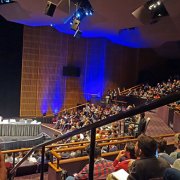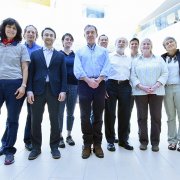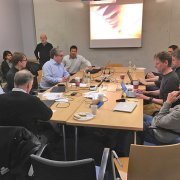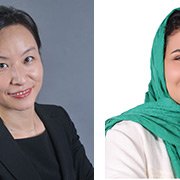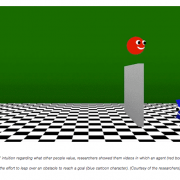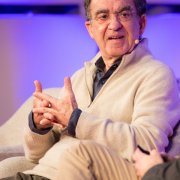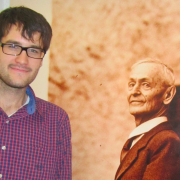February 12, 2018 - 4:15 pm
New ideas and old friends
Written by Kris Brewer, photos by Tomotake Sasaki
The annual Conference on Neural Information Processing Systems (NIPS), traditionally held in December, continues to grow since its inception in 1986. The 2016 conference had about 5000 registered participants and substantially grew to 8000 this past December, 2017 making it the largest conference on Artificial Intelligence in the world. Besides machine learning and...
February 2, 2018 - 4:00 pm
Boris Katz
Brief summary of the CBMM-Google Summit, Mountain View, CA, from Jan. 17, 2018 to Jan 20, 2018.
February 1, 2018 - 12:30 pm
New Institute-wide initiative will advance human and machine intelligence research.
Peter Dizikes | MIT News Office
"MIT today announced the launch of the MIT Quest for Intelligence, an initiative to discover the foundations of human intelligence and drive the development of technological tools that can positively influence virtually every aspect of society.
The announcement was first made in a letter MIT President L. Rafael Reif sent to the...
January 31, 2018 - 5:00 pm
by Sara Cody
When it comes to brain teasers, understanding how the human mind produces intelligent behavior is one of the most puzzling. Especially when it comes to programming machines with human-level intelligence. Figuring out how humans see, hear, move, reason, communicate and learn is complicated. But as a society, we have a lot to gain by succeeding.
“I think the problem of intelligence is the greatest problem in science because it means...
January 11, 2018 - 12:15 pm
In September 2014, Siemens Healthcare generously established the CBMM Siemens Graduate Fellowship. This fellowship provides support, for one academic year, to an MIT graduate student whose research bridges two of the main CBMM disciplines (computer science, cognitive science, and neuroscience) and contributes to CBMM goals of furthering our understanding of human intelligence and engineering new methods based on that understanding. During the...
January 9, 2018 - 9:15 am
On December 13-14, 2017, principal investigators from CBMM and the Science of Intelligence Initiative (SCIoI) held a workshop at MIT to determine joint research initiatives. SCIoI is currently under review as a proposed Cluster of Excellence in the Excellence Initiative by the German government. SCIoI shares with CBMM the vision of understanding intelligence by creating a new interdisciplinary field—the Science and Engineering of Intelligence....
January 1, 2018 - 1:30 pm
"On a quest to demystify deep learning, Tomaso Poggio glimpses tantalizing implications for human intelligence
by John Pavlus
Talk to neuroscientist Tomaso Poggio for any length of time, and you’re likely to learn more than one unexpected fact about brains, minds, or machines. Like, for example, the fact that the size of a fruit fly’s brain—when the number of neurons are plotted logarithmically—lies almost exactly halfway between the human...
December 22, 2017 - 9:00 am
Hunter College’s new interdisciplinary course in computational cognitive neuroscience has just received approval as a Scientific World course for all 278,000 students at The City University of New York (CUNY). As a partner in MIT's Center for Brains, Minds, and Machines, Hunter Professor Susan L. Epstein has pioneered SCI 111, a course for first-year students that combines cognitive neuroscience, cognitive psychology, and artificial intelligence...
December 15, 2017 - 4:30 pm
Jeff Hawkins, Co-Founder, Numenta
Please note the change in start time. This talk will be starting at 4:30pm, on Friday, Dec. 15, 2017.
Abstract: In this talk I will describe a theory that sensory regions of the neocortex process two inputs. One input is the well-known sensory data arriving via thalamic relay cells. We propose...
Abstract: In this talk I will describe a theory that sensory regions of the neocortex process two inputs. One input is the well-known sensory data arriving via thalamic relay cells. We propose...
December 13, 2017 - 12:00 pm
Larry Hardesty | MIT News Office
December 13, 2017
Excerpt: "Josh Tenenbaum, a professor of brain and cognitive sciences at MIT, directs research on the development of intelligence at the Center for Brains, Minds, and Machines, a multiuniversity, multidisciplinary project based at MIT that seeks to explain and replicate human intelligence.
Presenting their work at this year’s Conference on Neural Information Processing Systems, Tenenbaum and...
December 1, 2017 - 4:00 pm
Akram Bayat (UMass Boston, Visual Attention Lab)
, Wei Ding (UMass Boston, Knowledge Discovery Lab)
Host: Mandana Sassanfar
Akram Bayat: From Motor Control to Scene Perception: Using Machine Learning to Study Human Behavior and Cognition
Abstract:
In this presentation, as part of my work at UMass Boston, two dimensions of implementing machine learning algorithms for solving two important real...
Akram Bayat: From Motor Control to Scene Perception: Using Machine Learning to Study Human Behavior and Cognition
Abstract:
In this presentation, as part of my work at UMass Boston, two dimensions of implementing machine learning algorithms for solving two important real...
November 23, 2017 - 11:00 am
Ten-month-old infants determine the value of a goal from how hard someone works to achieve it.
Anne Trafton | MIT News Office
November 23, 2017
Excerpt:
Babies as young as 10 months can assess how much someone values a particular goal by observing how hard they are willing to work to achieve it, according to a new study from MIT and Harvard University.
This ability requires integrating information about both the costs of obtaining a goal and...
November 17, 2017 - 2:00 pm
Klaus-Robert Müller, Technische Universität Berlin
Abstract: In recent years, machine learning (ML) and artificial intelligence (AI) methods have begun to play a more and more enabling role in the sciences and in industry. In particular, the advent of large and/or complex data corpora has given rise to new technological challenges and possibilities...
November 7, 2017 - 3:00 pm
Autonomous cars and Go-playing computers are impressive, but we’re no closer to machines that can think like people, says neuroscientist Tomaso Poggio.
by Antonio Regalado
Intelligent Machines | MIT Technology Review
Excerpt: "Recent advances that let computers play board games and drive cars haven’t brought the world any closer to true artificial intelligence.
That’s according to Thomas Poggio, a professor at the McGovern Institute for Brain...
November 3, 2017 - 4:00 pm
McGovern Seminar Room (46-3189)
Ryan Cotterell
Title: Probabilistic Typology: Deep Generative Models of Vowel Inventories
Abstract: Linguistic typology studies the range of structures present in human language. The main goal of the field is to discover which sets of possible phenomena are universal, and which are merely frequent. For example,...
Abstract: Linguistic typology studies the range of structures present in human language. The main goal of the field is to discover which sets of possible phenomena are universal, and which are merely frequent. For example,...

